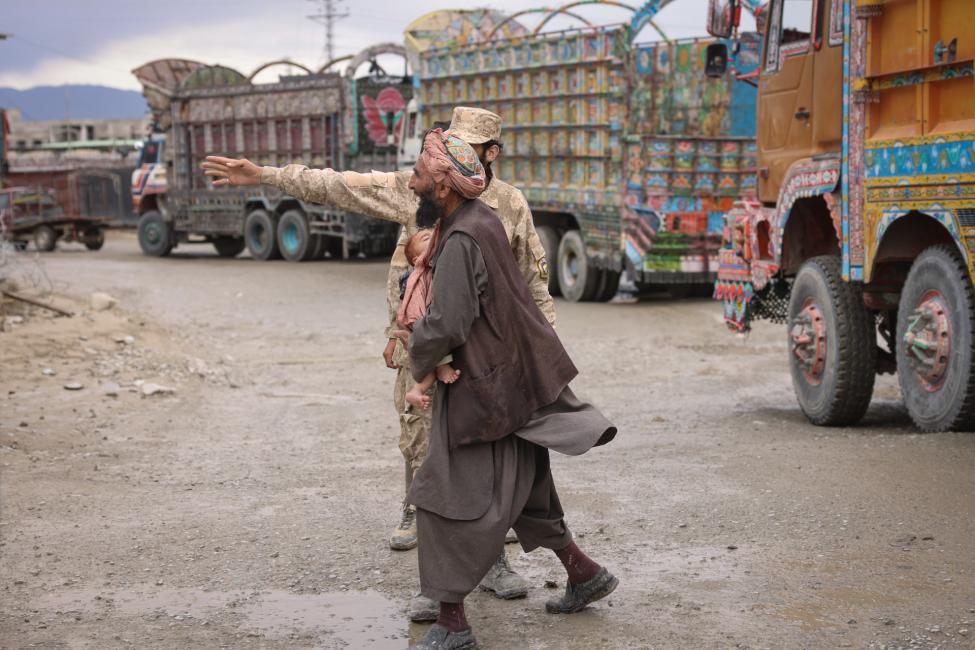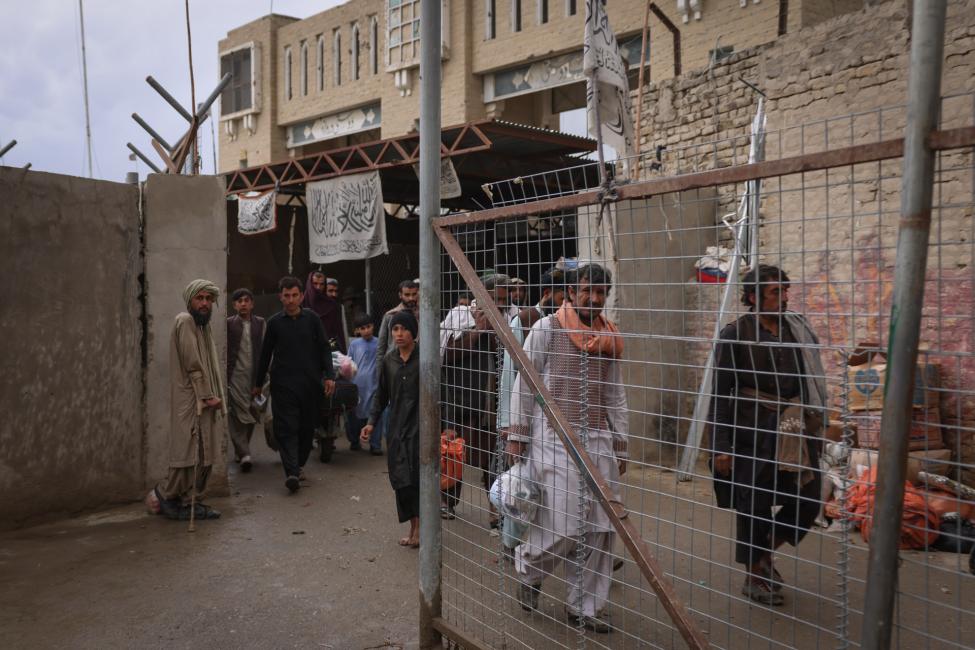-
Who We Are
WHO WE AREThe International Organization for Migration (IOM) is part of the United Nations System as the leading inter-governmental organization promoting since 1951 humane and orderly migration for the benefit of all, with 175 member states and a presence in over 100 countries.
About
About
IOM Global
IOM Global
-
Our Work
Our WorkAs the leading inter-governmental organization promoting humane and orderly migration, IOM plays a key role to support the achievement of the 2030 Agenda through different areas of intervention that connect both humanitarian assistance and sustainable development. Across Asia and the Pacific, IOM provides a comprehensive response to the humanitarian needs of migrants, returnees and host communities.
Cross-cutting (Global)
Cross-cutting (Global)
- Where we work
- Take Action
- Data and Resources
- 2030 Agenda
Spin Boldak, 24 May 2023 – On the border between Afghanistan and Pakistan, dozens of colorful trucks, cars and rickshaws crisscross a sandy road, creating thick clouds of dust. The atmosphere tense, rain begins to fall as the border guards of the de facto authorities (DfA) try to organize the coming and going of vehicles.
A few months ago, exchanges of gunfire resulted in deaths on both sides of the “Zero Point”, the line where Afghanistan becomes Pakistan. Since August 2021, tensions between the two countries have intensified. Brawls between guards at border crossings like Spin Boldak or Torkham are recurrent.[1]
From the east to the south-west of Afghanistan, across the Durand Line, a fence some 2,600 kilometres long divides the two countries. Spotlights beaming from guard posts chase through the mountains to ensure no travelers, from refugees to migrants, cross to the other side overnight.
Nevertheless, many Afghans attempt to travel to Pakistan, whether regularly or irregularly, usually to work, study, seek medical treatment, visit family or flee life-threatening situations. Smuggling routes are being used more frequently as many Afghans lack the legal documentation required to travel. In March 2023, at least 340,000 Afghans traveled to Pakistan through the border points and an estimated higher number did so through irregular crossing points.
A constant stream of men, women and children make their way across the labyrinth of corridors and wire mesh which form the border. They walk through the pouring rain, bags slung over their shoulders, their feet trudging through puddles and mud, to reach the other side. Whether they are leaving or returning to Afghanistan, the flow of people is continuous. Staff from the International Organization for Migration (IOM) are posted on each side of the border, counting the departures and arrivals, and providing health screening on communicable or epidemic-prone diseases to reduce any exposure risk back in their communities.
Today, the IOM Reception Centre in Spin Boldak is receiving more and more undocumented returnees and deportees who did not or could not obtain legal status in Pakistan. Since the beginning of the year, there has been a spike of undocumented Afghans being deported. More than 2,000 people were deported from January to March 2023, compared to 500 in the same period of last year. This number is likely to quickly surpass the total number of deportations recorded in 2022 (2,900).
“Our home was damaged due to a land mine explosion,” says Zari Gul, a 53-year-old Afghan mother of six. “My husband and I were forced to go to Pakistan due to conflict [a few years ago].”
“When we moved to Pakistan, my husband found a job as a daily wage worker, but in the last few months the police arrested all the Afghans [in my neighbourhood], and they also arrested my husband,” she adds. “I found out that he was detained after one month and when I went to the police station, they put me and my children in jail too. There were a lot of Afghans. We women were in one room and the men were in separate rooms; they did not give us proper food.”
Due to the complexities in the relationship between the two countries, the conditions of undocumented Afghans in Pakistan are deteriorating with recent reports of people being detained for several months before being sent back to Afghanistan.
“During the conflict in Afghanistan [several years ago], we were displaced from Uruzgan to Kandahar,” says Basmina, a 45-year-old Afghan mother of four. “We didn't have a good life in Kandahar, so my husband decided that we would all go to Pakistan.”
“Three years later, he had health problems and died. I was a single woman in Pakistan and my children were small. People said that the police would capture Afghans and take them to prison if they didn't go back to Afghanistan. I left, but two of my children stayed.”
Exhausted from her perilous journey, Basmina arrived at the Reception Centre in Spin Boldak and through transportation provided by IOM, was transferred to the organization’s Transit Centre in Kandahar where she was able to spend the night and receive assistance.
Reluctant to return to her life in Kandahar, she explains, “I am not free to move and go outside as I want.” Even before going to Pakistan, Basmina never possessed any legal documents, and today remains undocumented. Moving around Kandahar as a single woman, with the rules and norms imposed by the DfA, is almost impossible.
“My two other boys are underage, and they are the ones working to bring an income to our household. I wish my two girls could go to school.”
Fewer and fewer undocumented returnees and internally displaced persons (IDPs) in Afghanistan have proper documentation. The lack of access to civil registration documents, including Tazkira, the national identity card, and passports, is the result of intermittent service provision by the Department of Population and Registration in Afghanistan. In addition, women like Basmina, and members of ethnic minority groups, are more likely to be undocumented because they have never obtained documents due to historic political and socio-cultural norms.
During their journeys, undocumented returnees are more likely to face human rights violations by state security forces of neighbouring and transit states. These include the use of force and firearms, torture and other cruel, inhuman, or degrading treatment or punishment. It is essential that the humanitarian community raise awareness of, and advocate against, these abuses and that the DfA facilitate access to civil documentation for all.
IOM caseworkers support women like Basmina to connect with their families and access shelter, food, livelihood opportunities and other essential services upon their return. IOM is also working with partners at the Reception and Transit Centres to raise awareness on legal documentation among undocumented returnees for them to have a better understanding of the process of obtaining legal documentation and the benefit of holding such documents.
In 2023, based on receiving additional resources, IOM plans to provide protection assistance to 6,500 undocumented Afghan migrants returning from Pakistan through Spin Boldak and Torkham borders.
After the 24 December 2022 decree prohibiting Afghan women from working with national and international non-governmental organizations was recently enforced for women for working with the United Nations, IOM has been forced to temporarily suspend operations, as it is impossible to deliver principled humanitarian assistance without accessing half of the population. As a result, undocumented female returnees traveling alone, such as Zari Gul and Basmina, can no longer be reached. In coordination with the UN leadership and humanitarian organizations, IOM is advocating for the DfA to urgently revoke the decision banning Afghan women from working for humanitarian organizations and to ensure that basic services are available and accessible to all regardless of sex, ethnicity, civil or financial status, or any other distinction, in line with their obligations under international human rights law and cultural requirements.
Names and identifying details have been changed to protect the identity of returnees.
This story was written by Léo Torréton, Media and Communications Officer, IOM Afghanistan. For more information, please contact: ltorreton@iom.int
[1] For more information, see ACLED December 2022 Regional Overview of Asia-Pacific






